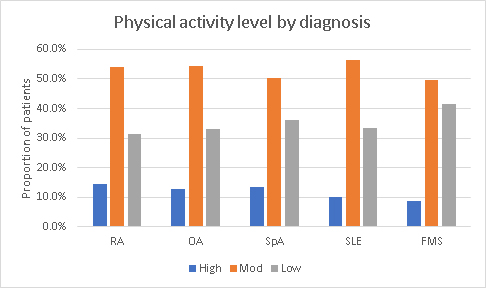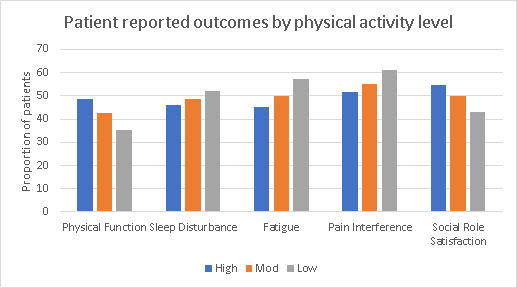Session Information
Date: Saturday, November 7, 2020
Title: Epidemiology & Public Health Poster II: OA, Osteoporosis, & Other Rheumatic Disease
Session Type: Poster Session B
Session Time: 9:00AM-11:00AM
Background/Purpose: Among patients with rheumatic disease, physical activity is important for maintaining health and improving outcomes. EULAR recommendations suggest at least 30 min of vigorous exercise three times weekly. This may be particularly important for older adults in whom it is important to maintain strength and physical function. The objective of this study was to describe patient-reported level of physical activity across different diagnoses as well as the association between activity level and patient reported outcomes (PROs) among adults age 65 and older with rheumatic disease.
Methods: We performed a cross-sectional analysis among adults age 65 and older using data from Forward, The National Databank for Rheumatic Diseases, a patient registry based in the U.S. As a part of the registry, participants (pts) complete a survey every 6 months. Three questions about physical activity were added to the survey in 2019: level of physical activity, number of days per week during the month the participant exercised for 30 min or more, and perceived activity level compared to others their age. Pts also complete several other PROs including the PROMIS29 assessment, medication use, side effects, and interactions with the health care system. Proportion of pts with each disease reporting levels of disease activity and mean PRO scores by level of disease activity were descriptively reported.
Results: Among 5,335 pts completing the first questionnaire, 3,343 were age 65 or older and among these, 2,278 pts had rheumatoid arthritis (RA), 681 osteoarthritis (OA), 111 spondyloarthritis (SpA, including both axial SpA and psoriatic arthritis), 161 systemic lupus erythematosus (SLE) and 137 fibromyalgia syndrome (FMS, diagnosed by physician) (diagnoses were not mutually exclusive). The mean age overall was 74.4 (SD 6.6). Most pts were female (83%). Overall, 468 (14%) pts reported vigorous physical activity for at least 30 minutes 3 or more days were week, 1,799 (54%) reported moderate activity 3 or more days per week, and 1,076 (32%) reported seldom being active. This was similar across diseases. (Figure 1) Overall, participants reported a median of 7 days of physical activity per month (IQR 0-15). Obese participants were significantly more likely to report low levels of activity (44% of obese compared to 25% of non-obese individuals). Similarly, among patients with depression, 48% reported a low level of activity compared to 30% of those without depression. Finally, diminishing levels of physical activity were associated with poorer sleep, fatigue, physical function, pain, and pt global assessment of disease (Figure 2).
Conclusion: Levels of physical activity were relatively low among older pts with RA, OA, SpA, SLE and fibromyalgia. Because people tend to over-report their amount of exercise, the actual proportion exercising is likely even lower. Participants with the lowest level of physical activity were more likely to have depression, poor sleep, and fatigue and more likely to be obese. As these factors can improve with activity, these patients may be ideal targets for physical activity engagement strategies.
 Figure 1. Physical activity level by diagnosis. Physical activity level was categorized as high (vigorously active for at least 30 min, 3 times per week), moderate (moderately active for at least three times per week) or low (seldom active).
Figure 1. Physical activity level by diagnosis. Physical activity level was categorized as high (vigorously active for at least 30 min, 3 times per week), moderate (moderately active for at least three times per week) or low (seldom active).
 Figure 2. Patient reported outcomes by level of physical activity. Physical activity level was categorized as high (vigorously active for at least 30 min, 3 times per week), moderate (moderately active for at least three times per week) or low (seldom active). PROMIS scores increase for a patient having ‘more’ of the construct (i.e., higher physical function scores are good, higher pain scores are bad).
Figure 2. Patient reported outcomes by level of physical activity. Physical activity level was categorized as high (vigorously active for at least 30 min, 3 times per week), moderate (moderately active for at least three times per week) or low (seldom active). PROMIS scores increase for a patient having ‘more’ of the construct (i.e., higher physical function scores are good, higher pain scores are bad).
To cite this abstract in AMA style:
Ogdie A, Pedro S, Baker J, Michaud K, Katz P. Exercise Among Older Adults Living with Rheumatic Disease: Physical Activity Habits and Patient Reported Outcomes [abstract]. Arthritis Rheumatol. 2020; 72 (suppl 10). https://acrabstracts.org/abstract/exercise-among-older-adults-living-with-rheumatic-disease-physical-activity-habits-and-patient-reported-outcomes/. Accessed .« Back to ACR Convergence 2020
ACR Meeting Abstracts - https://acrabstracts.org/abstract/exercise-among-older-adults-living-with-rheumatic-disease-physical-activity-habits-and-patient-reported-outcomes/

